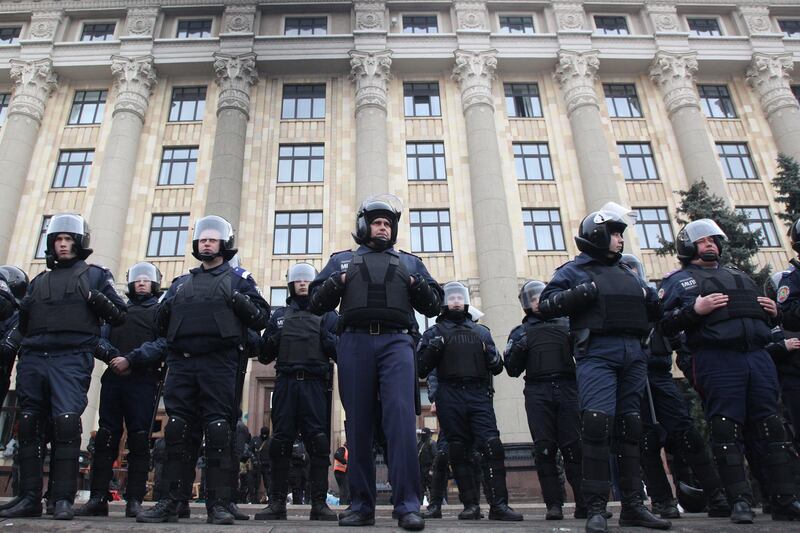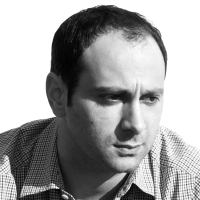SLOVIANSK, Ukraine -- As you journey through eastern Ukraine, the region’s descent into widespread lawlessness becomes more apparent by the day. Who represents authority? Who represents order? These are critical questions on which the fate of a nation now hangs. One after another, government buildings in as many as a dozen cities and towns have fallen to professionally trained soldiers and their Russian-speaking followers calling for referendums, independence and annexation by Moscow. The government in Kiev, its territory and its legitimacy threatened at every turn, has vowed to clean out these “terrorists,” but hesitates lest the tens of thousands of Russian troops poised on the border roll into Ukraine to “protect” them.

In the middle of this stand-off stand the Ukrainian police. And standing by, for the most part, is about all that most of them are doing.
Donetsk was the first occupied city I hit on my travels in the east over the last several days. Driving in just before midnight the only people I saw on the streets were groups of masked men carrying bats and sticks. There was no sign of police anywhere.
It was the same story up by the barricades outside the occupied Donetsk City Hall. Armed protestors wandered freely around in front of the building while people lit fires in the street and drank beer and vodka. I wandered the area for fifteen minutes looking for any sort of a police presence and finally found it: one police car around the back of the building, parked up on the pavement, with two middle-aged officers leaning against it, smoking. When I pointed to the occupied building they just shrugged their shoulders and smiled. It was difficult that night to know whether the police were being negligent, were supporting the protestors or had been ordered to stay back for fear of inflaming the situation.
As I returned to City Hall the protestors, who had up until then largely stuck to low-key surliness broken up by sporadic chanting in support of Russia and a referendum, began to become agitated. It was clear that some information had been received and that it was now coursing through the crowd. Groups of the most heavily armed men start running toward a tree-lined avenue off to the right of the occupied building. More baseball-bat-wielding men soon joined them, urging yet more of their fellow protestors to join them and allowing me the opportunity to tag onto the end.
As we rounded the corner I saw a bus filled with police parked by the pavement. The protestors surrounded it and screamed at the policemen inside. “Why are you here?” screamed a couple of the ringleaders. “You are provocateurs!” another shouted at the police. “You are here to remove us!”
A few members of the mob threw some small stones and other assorted debris, though they were noticeably reluctant to part with the beer bottles they were holding. The police inside, clearly alarmed, did nothing while their senior officer leaned out of the window and tried to placate the mob. As more protestors surrounded the bus one of the policemen inside tapped a text into his phone and held it up to the window. The protestors surged forward to read it: “We are with the people,” it read. “We are not going to storm the building.”
I discovered a similar story in the nearby city of Luhansk. Once more, “protestors”—this time armed with machine-guns—wandered around inside the state-security building they had occupied while a few gloomy policeman idled by the side of the road several streets away. Approaching the town of Sloviansk a day later, where armed protestors had stormed the main police station, it was clear that things there were even worse.
In Sloviansk, police stood with protestors at a militia checkpoint on the outskirts of the town, working in concert with them. After the usual interrogation (“Where are you from? Are you American? Why are you coming here?”) from some militia we asked them why the police were there. “Oh, they are with us,” said the leader of the group, a man in his fifties, dressed in camouflage, wearing a peaked military cap. “The police are the people, too.”
The protestors in Sloviansk had stormed the police station there without difficulty, to be sure, but the militia leader’s explanation was perhaps a little too simplistic. Politics not solidarity rules in this part of the world. The town’s mayor, Nelya Shtepa, is from ousted pro-Russian President Viktor Yanukoych’s Party of Regions, and has close links to Yanukoych’s son, also called Viktor, who remains heavily involved in politics in the East. The Yanukoyches are from the Donbass region and both Donetsk and Luhansk are Party of Regions strongholds. There is much personal loyalty to the Yanukovych family here. In both cities I saw protestors proudly wearing sweatshirts emblazoned with the party’s logo. It is little surprise that the police offered no resistance.
“The police in Ukraine have been deliberately and systematically destroyed over a number of years,” says Nataliya Gumenyuk, a Ukrainian journalist and co-founder of the independent online TV station Hromadske.Tv. “Yanukovych had strong links to the police force, especially in his hometown region of Donetsk. The police in the east of Ukraine have been the most corrupt sphere of local government for a long time; they are politically controlled and on the payroll.”
“The main body of police is fairly demoralized and many of its most senior members have a checkered history for which they could be called to account by a new government in Kiev,” says Oliver Carroll, outgoing editor of Open Democracy Russia. “The boss class has been switched a few times, often with appointees sent from Kiev, which has created confusion in the ranks. The towns where there is a big Party of Regions presence are falling faster.”
Where the Party is not so entrenched things are different. In Kramatorsk, where the mayor, Gennady Kostiukov, is closer to Kiev, the police fought back and a fierce gun battle took place with protestors. If Ukraine’s government is to hold the East it will need the support of many more like him.
A series of polls conducted show that eastern Ukraine’s Russian-speaking population clearly favors a united Ukraine and has no wish to join Russia. But the silent majority are kept off the streets by armed pro-Russia separatists and are denied their voice by the vagaries and corruption of Ukrainian politics. What are they to do? Calling the police is not an option.





